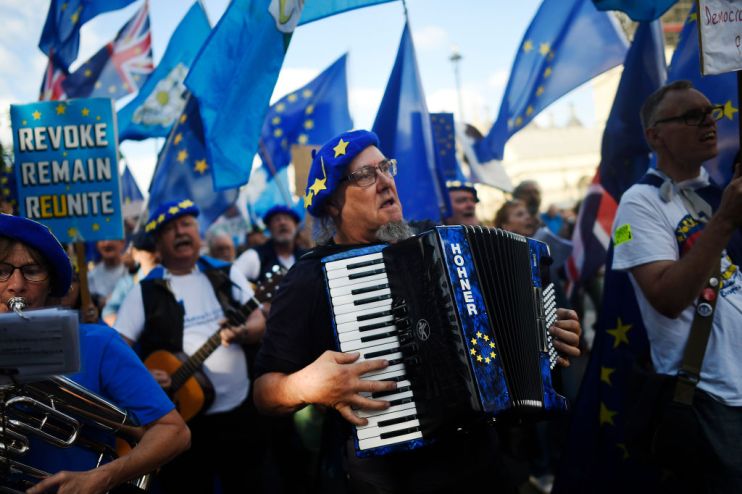Think Brexit is a mess? Imagine what Remain would look like now

Stop Brexit.
For those working in Westminster, this has become the song of the summer, chanted by the throng of ultra-Remainers who have pitched camp next to the media gazebos on College Green.
It is the – intensely irritating – evidence of what the polls increasingly tell us. Just as Leavers are coalescing around a no-deal Brexit, so Remainers are moving towards the cancellation of Brexit full stop. The space in the middle for compromise is increasingly barren.
But say that we did stop Brexit. What then?
The fact is that there has been an awful lot of examination and cross-examination of the consequences of no-deal – and, indeed, of the withdrawal agreement negotiated by Theresa May, and all the other options for Britain’s Brexit arrangements that have been floated since the referendum took place.
There has been much less consideration, however, of what would actually happen if Brexit were cancelled. That is because the answer is seemingly obvious: a return to the status quo ante. Yet, that position is as fantastical – or, to be more polite, impossibilist – as the anti-Brexiteers say a successful no-deal outcome would be.
The option of getting into a time machine and setting the dial for June 22, 2016 is understandably attractive – certainly for those of us who voted Remain. But the reality would be very different.
For starters, you would have a very substantial chunk of the population – the polls suggest approximately a third – who would be not just aggrieved, but incandescent. The most important vote of their lives would be rendered meaningless.
Just as a reminder, there is no evidence whatsoever that Leave voters have changed their minds about Brexit in anything like the numbers required to invalidate the result. Those voters would be not just lured to parties of the extreme right or left, but given the most almighty shove.
You might argue that the way to get around this would be to offer a second referendum. But what would be the criteria?
Labour is proposing a two-way battle between Remain and May’s deal. But for many of those who disliked that deal (which, polls show, is a substantial number), this would be a referendum without Brexit on the menu.
A vote between Remain and no-deal would offer a genuine choice, but would also be structurally rigged in favour of Remain. And a poll allowing voters to choose between the three of them would be fatally influenced by the architecture and wording of the question and options.
Still, let us say that Britain does end up remaining within the EU. We would further destabilise, or even delegitimise, the UK’s political system, with a solid body of opinion campaigning vociferously against continued EU membership in general and every single decision made by Westminster or Brussels in particular.
We would also find ourselves in a hellishly awkward diplomatic position. None of the issues and tensions which led the country to vote to leave in the first place would have been resolved – it is doubtful whether we would even receive those concessions which David Cameron so painfully negotiated back in 2016.
In the short term, we would surely not be forced to join the euro or Schengen area, but we would have lost much of our political capital to oppose the EU’s federalising tendencies. What would we do if we didn’t like how the EU was evolving, or if we were pressured to drop our opt-outs? Threaten to Brexit again?
Indeed, it is striking that France’s Emmanuel Macron has said that he doesn’t particularly want Britain back in the tent, because we would disagree with the direction in which he wants to take the EU – towards greater unification.
In the run-up to the referendum, I interviewed the leaders of the three main campaigns – Vote Leave, Leave.EU, and Stronger In.
I was told by Stronger In that they intended to fight an optimistic, positive campaign, and to make the case for Europe. Of course, they never did, because they could read the polls. They knew that the vast majority of Britons were profoundly disillusioned with the European Union. The only convincing message they could use was that the uncertainty of leaving was worse than the devil you knew.
One of the great ironies of the post-referendum period is that it has finally given birth to what Britain, almost uniquely among EU members, has never had: a genuine europhile mass movement.
For those shouting outside Westminster, or painting their faces with blue and yellow stars, the EU has come to be synonymous with civilised values – the household god of the Islington dinner party.
Yet in the process, its members have become just as driven by emotion as the Leavers they oppose.
Main image credit: Getty